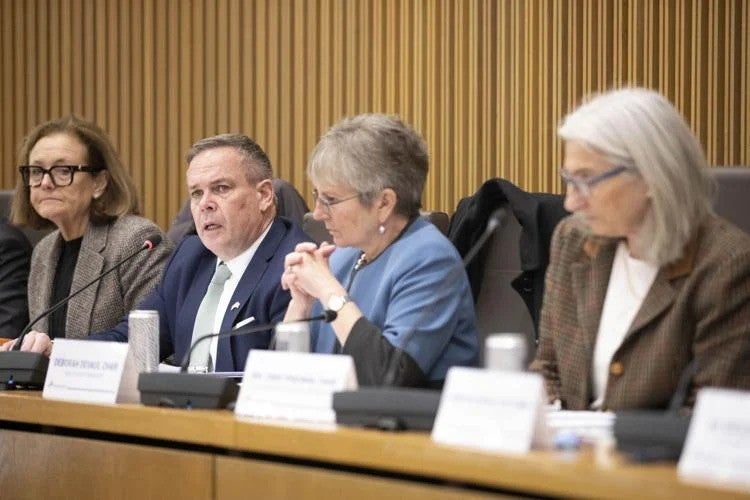Less than two weeks after the Senate moved to create a new prescription drug price cap system in Massachusetts, an industry official warned against legislative “leapfrog” that could complicate the most recent round of reforms.
A top pharmaceutical industry lobbyist urged lawmakers to hit the brakes on an attempt to impose upper price limits on certain medications, arguing that the new regulations would come while another cost control law is still being implemented.
Both a 23-page amendment added to the Senate’s fiscal year 2026 budget and a much broader, 118-page standalone bill (S 868) would allow the Health Policy Commission to impose upper price limits on some prescription drugs to cap what patients, providers and pharmacies pay.
Kelly Ryan, deputy vice president for state policy at the influential industry group PhRMA, told legislators Monday the proposal would “leapfrog substantial legislation enacted here in Massachusetts just this past December,” referring to a new prescription drug price control law.
That law limited patient costs to no more than $25 for certain name-brand medications to treat chronic illnesses and eliminated those costs for similar generic options. It also created a new licensure process for pharmacy benefit managers, and stood up an Office for Pharmaceutical Policy and Analysis within the HPC.
“Where the bill before you focuses primarily on manufacturers when we’re looking at pricing, the office is tasked with looking at the broader supply chain, providing detailed analysis, reports and policy recommendations,” Ryan told the Health Care Financing Committee at a hearing about the new bill. “We urge the committee to let that work proceed before taking any next steps.”
The Senate has not embraced the industry call to slow down. In late May, before lawmakers heard testimony on the larger bill at a public hearing, the Senate adopted a budget rider that would empower the HPC with the ability to cap certain drug costs and set limits on what Bay Staters pay.
Sen. Cindy Friedman, who co-chairs the Health Care Financing Committee and authored both the bill and the amendment, said during budget debate the upper price limit measure builds on the new law with “one more step in that direction.”
“Pharmaceutical companies should be thrilled to have their drugs go through this because they should have enormous value, right?” she told Ryan during Monday’s hearing. “We’re looking for drugs that are very high cost with lots and lots of value. We want to know about that, and we’re willing — we believe people should be willing to pay for that. It would seem to me this would work in your favor because, I would hope, your drugs have enormous value.”
A handful of other states have pursued similar price caps, prompting legal battles. Ryan said “not one [state’s system] has been implemented to date.”
“States have spent years and millions of dollars, and not a single patient has been impacted,” she said. “In fact, patients are likely going to be negatively impacted by [upper price limits].”
Health care spending in Massachusetts continues to surge well beyond state targets for cost containment, burdening many household budgets and putting care out of reach for some low-income residents.
While the Senate budget amendment focuses on prescription drug price caps, Friedman’s underlying bill reaches into many other areas of reform, including by giving regulators more flexibility to examine an individual hospital, health system or insurer’s spending.
The legislation would also boost penalties for failure to comply with cost control plans and give the Division of Insurance new tools to modify premium rate increases, according to a summary produced by advocacy group Health Care for All.
“It is individuals, families and businesses who will ultimately bear the burden of these costs, both through increased premiums and growing out-of-pocket costs. An unacceptable 40% of residents continue to report challenges affording care,” Alex Sheff, senior director of policy and government relations at Health Care for All, said. “These costs come on top of the growing cost of living, challenges that leave residents with impossible choices between paying rent and getting the health care that they need.”
The Health Care Financing Committee is weighing a suite of other bills supporters say would rein in health care costs and promote affordability.
Committee co-chair Rep. John Lawn said at the start of Monday’s hearing that the panel “must put more focus on all areas of the drug supply chain” to understand what causes high drug prices.
Another proposal before the panel (H 1398 / S 899) would require hospitals receiving state funding to compensate their CEOs at a rate no more than 50 times the amount that the hospital’s lowest-paid worker earns.
Dr. Taylor Walker, a physician at Cambridge Health Alliance and president of the physician union CIR SEIU, said 44 of 57 health care CEOs in Massachusetts earn more than 50 times the salary of their institution’s lowest-paid worker.
Rep. John Moran asked Walker if the CEO compensation limit could push health care executives to leave for higher-paying roles elsewhere, such as in the pharmaceutical sector.
“I’d say the problem is actually not losing talent because we don’t want to pay CEOs $6 million a year. The problem is that we’re losing talent because we don’t want to pay our doctors who are actually taking care of our patients, and we don’t really give a shit about the people who are taking care of our communities,” Walker said. “This is something that is absolutely maddening.”

